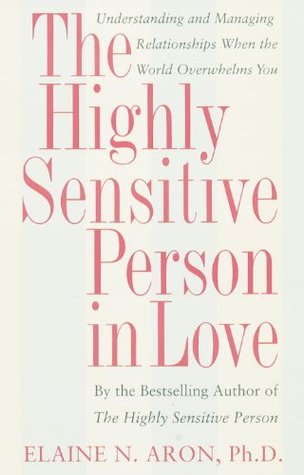More on this book
Community
Kindle Notes & Highlights
Started reading
October 20, 2025
If You Are Not in Love Right Now Please know that you were often on my mind as I wrote, because I meet so many HSPs who are not in close relationships—by choice or not. But whatever the state of our current relationships, we HSPs tend to be more sculpted by our loves than others are. We tend to fall in love harder than others. So we can always benefit from reflecting on our past loves. Goethe is supposedly the source of a sentiment I like: I love you, and it has nothing to do with you.
“Investments, cars, sports, getting ahead at work—I don’t say it, but I’ve zero interest in those things compared to my love for my wife.”
Research psychologist John Gottman finds that 69 percent of the conflicts couples have turn out to be perpetual and unresolvable, and happy and unhappy couples have the same percentage of these unresolvable conflicts. So much for the theory that happy couples have fewer long-standing troubles because they are more skilled at solving their problems—they have just as many and are just as stuck by them.
A word about boredom: I see signs from research and my practice that boredom with the other person or the relationship, or what feels like boredom, is one of the most frequent problems couples encounter, and it is usually related to temperament issues. Couples come for help after boredom has led to fighting, lack of respect, or an affair, and so it is never directly confronted. In this book we will confront it.
We are more easily made depressed or anxious due to traumas, processing those more deeply too.
HSPs who are also HSSs need special help finding their optimal level of arousal. You are easily bored and easily overwhelmed. You are often in conflict about going out or staying home, doing more or doing less, and it isn’t just about wanting to be like the non-HSPs around you. It’s a “hardwired” inner conflict, and it can be intense. For example, you have a business scheme you love and know will work but also know how much stress is involved in starting any new enterprise, and you are already overloaded. What to do? ESPECIALLY FOR HSP/HSSs First stop blaming yourself for your “neurotic” or
...more
Then there are the differences that are not considered ideal for a particular gender, the topic of the next chapter. Men are supposed to be decisive, stoic, logical, and not really sensitive. Women are supposed to be gregarious, good with kids, skilled at expressing feelings, and deeply sensitive. It is implied that if you don’t have a “real man” or “feminine woman” for a partner, you have been shortchanged. It’s time to work on this—sensitivity has been confused with gender for too long.
Being highly sensitive to others’ emotional needs, including your partner’s, is not codependency. Codependency arises when you make the wrong response to the other’s needs. Especially in the word’s original meaning, you would never be called “codependent” for recognizing that your friend is an alcoholic and needs help, but only for failing to confront him or her.
Intimacy with another person certainly involves risks—loss, betrayal, abandonment, or being used or controlled by the other person, just for starters. So while intimacy is highly praised these days and sounds wonderful in theory, in practice, all HSPs have their reasons to pause before plunging in—some reasons are conscious, some are less conscious.
As for the breakup of a relationship, it is just that—the blending of two lives is sundered, and it feels terrible. HSPs often resist a breakup for just this reason. All sorts of endings hurt.
Then there’s the insidious fear of betrayal, as when a partner you thought loved you has an affair with someone else. We all know people who have waited years or even a lifetime to trust anyone again after such an experience. And there are those shameful bouts of jealousy that can result and lurk for years afterward.
If we have experienced loss, abandonment, or betrayal early in childhood, before the self was strong enough to handle it, this deep-seated insecurity can pervade the entire personality;
The assumption that someone may betray you is especially hard to shed if it has ever happened to you. As an HSP you will be superbly cautious, doubting both others and your own judgment of whom to trust. What I am about to say may sound impossible to accept, but I think it is the goal: You cannot predict or stop the sort of eruptions in a partner’s unconscious that can cause even the seemingly nicest person to suddenly betray you, but to be fair, nor can you completely control your own. This is part of the unpredictability of life and of the human psyche. The worst part of the fear of betrayal
...more
But what you seek (and fear does not exist) is real love, the kind that would not wish for such sacrifices from you.
HSPs can also fear engulfment—or perceive it as that when someone else might just call it closeness—because we need more downtime than non-HSPs. A non-HSP partner can seem engulfing when he or she simply expresses a non-HSP’s normal capacity to spend all day and half the night being intimate.


